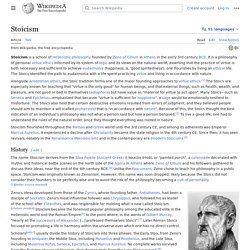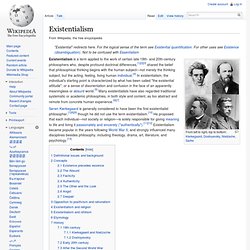

Stoicism. School of Hellenistic Greek philosophy Stoicism is a school of Hellenistic philosophy which was founded by Zeno of Citium, in Athens, in the early 3rd century BC.

Stoicism is a philosophy of personal ethics informed by its system of logic and its views on the natural world. According to its teachings, as social beings, the path to eudaimonia (happiness) for humans is found in accepting the moment as it presents itself, by not allowing oneself to be controlled by the desire for pleasure or fear of pain, by using one's mind to understand the world and to do one's part in nature's plan, and by working together and treating others fairly and justly.
Stoicism flourished throughout the Roman and Greek world until the 3rd century AD, and among its adherents was Emperor Marcus Aurelius. It experienced a decline after Christianity became the state religion in the 4th century AD. Naturalism (philosophy) Nihilism. Nihilism is also a characteristic that has been ascribed to time periods: for example, Jean Baudrillard and others have called postmodernity a nihilistic epoch,[4] and some Christian theologians and figures of religious authority have asserted that postmodernity[5] and many aspects of modernity[3] represent a rejection of theism, and that such rejection of their theistic doctrine entails nihilism.

Forms of nihilism[edit] Nihilism has many definitions, and thus can describe philosophical positions that are arguably independent. [edit] Metaphysical nihilism is the philosophical theory that there might be no objects at all—that is, that there is a possible world where there are no objects at all—or at least that there might be no concrete objects at all—so that even if every possible world contains some objects, there is at least one that contains only abstract objects. Determinism. Determinism is the philosophical position that for every event, including human action, there exist conditions that could cause no other event.

"There are many determinisms, depending upon what pre-conditions are considered to be determinative of an event. Absurdism. Absurdism is very closely related to existentialism and nihilism and has its origins in the 19th century Danish philosopher Søren Kierkegaard, who chose to confront the crisis humans faced with the Absurd by developing existentialist philosophy.[3] Absurdism as a belief system was born of the European existentialist movement that ensued, specifically when the French Algerian philosopher and writer Albert Camus rejected certain aspects from that philosophical line of thought[4] and published his essay The Myth of Sisyphus.

Existentialism. Existentialism is a term applied to the work of certain late 19th- and 20th-century philosophers who, despite profound doctrinal differences,[1][2][3] shared the belief that philosophical thinking begins with the human subject—not merely the thinking subject, but the acting, feeling, living human individual.[4] In existentialism, the individual's starting point is characterized by what has been called "the existential attitude", or a sense of disorientation and confusion in the face of an apparently meaningless or absurd world.[5] Many existentialists have also regarded traditional systematic or academic philosophies, in both style and content, as too abstract and remote from concrete human experience.[6][7] Definitional issues and background[edit] There has never been general agreement on the definition of existentialism.

The term is often seen as an historical convenience as it was first applied to many philosophers in hindsight, long after they had died. Instrumentalism. In the philosophy of science, instrumentalism is the view that a scientific theory is a useful instrument in understanding the world.

A concept or theory should be evaluated by how effectively it explains and predicts phenomena, as opposed to how accurately it describes objective reality. Instrumentalism avoids the debate between anti-realism and philosophical or scientific realism. It may be better characterized as non-realism. The 48 Laws of Power: Robert Greene. Background[edit] Greene initially formulated some of the ideas in The 48 Laws of Power while working as a writer in Hollywood and concluding that today's power elite shared similar traits with powerful figures throughout history.[5] In 1995, Greene worked as a writer at Fabrica, an art and media school, and met a book packager named Joost Elffers.[4][8] Greene pitched a book about power to Elffers and six months later, Elffers requested that Greene write a treatment.[4] Although Greene was unhappy in his current job, he was comfortable and saw the time needed to write a proper book proposal as too risky.[10] However, at the time Greene was rereading his favorite biography about Julius Caesar and took inspiration from Caesar's decision to cross the Rubicon River and fight Pompey, thus inciting the Great Roman Civil War.[10] Greene would follow Caesar's example and write the treatment, which later became The 48 Laws of Power.[10] He would note this as the turning point of his life.[10]

Jain Vegetarianism. Jain vegetarian diet is practiced by the followers of Jain culture and philosophy.

It is one of the most rigorous forms of spiritually-motivated diet on the Indian subcontinent and beyond. The Jain cuisine is completely vegetarian, and also excludes onions and garlic, similar to the shojin-ryori cuisine of Japan. The strictest forms of Jain diet is practiced by the monastic ascetics, it may additionally exclude potatoes and other root vegetables.[1][2] This food is called in Sanskrit a 'sattvic' food, which means that it is based on the qualities of goodness, lightness and happiness. On the other hand, onions and garlic are considered 'tamasic', as they are believed to have a quality of darkness, lethargy and a putrid smell. Jain objections to the eating of meat, fish and eggs are based on the principle of nonviolence (ahimsa, literally "non-injuring").
Practice[edit] For Jains, lacto-vegetarianism (generally known simply as vegetarianism in India and elsewhere) is mandatory.